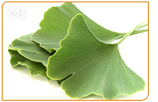How Ginkgo Biloba Can Help With Your Blood Flow During Menopause
Improving your blood flow during can help reduce the effects of some of some of the uncomfortable symptoms of menopause. Maintaining a regular circulatory system may help ease the frequency and intensity of hot flashes; ensuring that blood is pumped well through your reproductive organs will help combat any problems with vaginal dryness and loss of libido; and a regular blood flow will keep you feeling healthier, more active, and quell headaches and signs of fatigue.
 There are a number of ways you can improve your blood flow during menopause, but there is one in particular that is proving increasingly popular and effective. This little treatment is in the form of an herbal remedy, and goes by the name ginkgo biloba.
There are a number of ways you can improve your blood flow during menopause, but there is one in particular that is proving increasingly popular and effective. This little treatment is in the form of an herbal remedy, and goes by the name ginkgo biloba.
What is Ginkgo Biloba?
Ginkgo Biloba is a plant native to China. It is found trees, which are small and slender, and broaden with age, and it is the seeds and leaves of the plant that are harvested and used for medicinal purposes. It has been used in Chinese medicine for thousands of years to improve circulation, mood and mental agility, and is now popular as an herbal supplement throughout the US and Europe.
How Does Ginkgo Biloba Improve Blood Flow during Menopause?
 Ginkgo leaves contain chemicals called flavonoids and terpenoids. It has been argued that these chemicals have antioxidant properties. It reduces the number of free radicals, or damaging particles, within the body, and allows for easier circulation of the blood. An improved blood flow around the body can help ease menopause symptoms, including hot flashes, vaginal dryness, loss of libido and fatigue. In improving the circulatory system, ginkgo biloba also:
Ginkgo leaves contain chemicals called flavonoids and terpenoids. It has been argued that these chemicals have antioxidant properties. It reduces the number of free radicals, or damaging particles, within the body, and allows for easier circulation of the blood. An improved blood flow around the body can help ease menopause symptoms, including hot flashes, vaginal dryness, loss of libido and fatigue. In improving the circulatory system, ginkgo biloba also:
� Enhances capillary circulation
� Has Strong antioxidant effects
� Thins the blood
� Increases blood flow to major organs such as the heart and brain
� Prevents the formation of blood clots
What Other Benefits Does Ginkgo Biloba Have During Menopause?
As well as improving circulation, Ginkgo Biloba has hormonal properties which can help ease unpleasant menopausal symptoms. Ginkgo biloba is a phytoestrogenic plant. This means that it contains phytoestrogen, a natural substance which mimics the role of the hormone estrogen when introduced into the body. During menopause, when hormone levels are fluctuating, phytoestrogen can supplement estrogen levels, and lessen the intensity of menopausal symptoms.
As well as ginkgo biloba, there are a variety of herbal supplements that can help ease your menopausal hot flashes, vaginal dryness, loss of libido, headaches and fatigue. To find out more about herbal remedies and what they can do for your menopausal symptoms, click the link below.



























